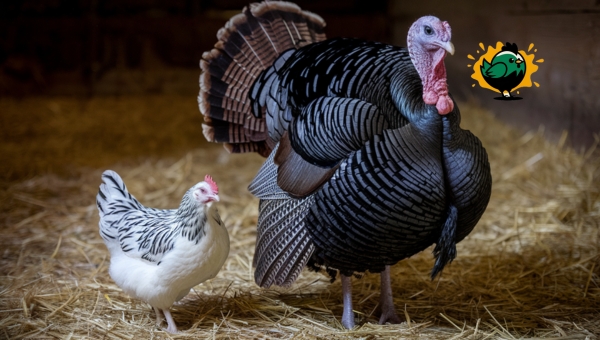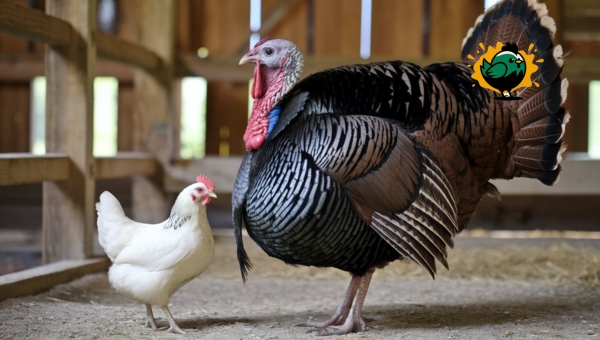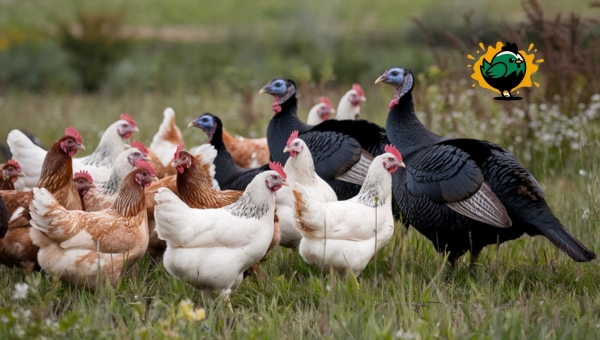Can Turkeys Live With Chickens? Discover the Truth!

A tranquil farmyard is full of activity, where birds and turkeys wander around and nibble at the ground. Can hens and turkeys coexist peacefully, though? As someone who loves backyard chickens, the idea of merging these feathered companions is both thrilling and unsettling.
It is essential to comprehend the dynamics of such a mixed flock before embarking on this endeavor. Considerations range from dietary requirements to behavior.
Join us as we investigate the possibility of these two birds living in harmony while revealing crucial knowledge and advice for keeping a flock happy and healthy.
Understanding Turkey and Chicken Behavior
When considering whether turkeys can live with chickens, it’s essential to understand their behavior. Each bird species has its social dynamics, which can affect how well they coexist. By examining these behaviors, we can better assess the potential for harmonious living conditions.

Social Behavior of Turkeys
Turkeys are generally social creatures, forming flocks with a clear hierarchy. Within these groups, turkeys communicate through vocalizations and body language, establishing roles and maintaining order.
They often engage in activities like dust bathing and foraging together. Understanding these dynamics is crucial, as turkeys prefer the company of their own kind, which provides them with a sense of security and community.
Social Behavior of Chickens
Chickens, like turkeys, are social animals that thrive in groups. Their social structure is often referred to as the “pecking order,” where each bird knows its place. Chickens interact with each other through pecking, clucking, and various movements.
They are curious and can be territorial, sometimes showing aggression toward unfamiliar species. Chickens also enjoy foraging and dust bathing, similar to turkeys, but they may react differently to other birds sharing their space. Understanding these behaviors is vital when integrating chickens with other species.
Environmental Needs
When considering raising turkeys and chickens together, it’s important to understand their environmental needs. Both species require specific conditions to thrive, and providing proper space and shelter is essential. Let’s delve into the space requirements and shelter considerations for these birds to ensure a harmonious living environment.
Space Requirements
Space is a crucial factor for the well-being of turkeys and chickens. Turkeys generally require more room due to their larger size and active nature. Each turkey needs about 10 square feet of space to move comfortably.
Chickens, on the other hand, can thrive with 4 square feet per bird. Adequate space helps reduce stress and prevent aggressive behavior, contributing to a peaceful coexistence.
Shelter Considerations
Creating a suitable shelter is vital for both turkeys and chickens to protect them from weather and predators.
Here are some essential features of a combined habitat:
- Ventilation: Proper airflow is necessary to maintain a healthy environment.
- Insulation: Ensure the shelter is insulated to keep the birds warm in winter and cool in summer.
- Roosting Areas: Provide elevated roosts for chickens and turkeys to rest comfortably.
- Secure Fencing: A sturdy fence is important to protect against predators.
By addressing these environmental needs, you can create a comfortable and safe space for your mixed flock.
Also Read: Protect Your Small Flock from Avian Influenza – Safe Tips
Health and Disease Concerns
When considering whether turkeys and chickens can coexist, one must examine the health risks involved. Both species are susceptible to various diseases, and understanding these risks is crucial to maintaining a healthy flock. Let’s delve into the common diseases affecting these birds and the potential for cross-species transmission.

Common Diseases
Turkeys and chickens are vulnerable to a range of diseases that can impact their health and productivity.
Here are some diseases to be aware of:
- Newcastle Disease: Affects both turkeys and chickens, causing respiratory issues.
- Fowl Cholera: Can lead to high mortality rates if not managed promptly.
- Avian Influenza: A serious viral infection that can spread rapidly among birds.
- Blackhead Disease (Histomoniasis): Primarily affects turkeys but can also impact chickens if they share the same environment.
Cross-Species Disease Transmission
The risk of disease spreading between turkeys and chickens is a vital consideration for mixed flocks.
Here are some key points to keep in mind:
- Biosecurity Measures: Implementing strict biosecurity can help reduce transmission risks.
- Shared Water and Feed: Common sources can facilitate the spread of pathogens.
- Close Contact: Direct interactions between species increase disease transmission chances.
- Environmental Factors: Poor ventilation and cleanliness can exacerbate disease spread.
By understanding these health concerns, bird owners can take appropriate steps to safeguard their animals and ensure a harmonious coexistence.
Feeding and Dietary Considerations
When it comes to raising turkeys and chickens together, understanding their unique dietary needs is essential. Each species has specific nutritional requirements that must be met to ensure their health and productivity. Let’s explore what each bird needs to thrive.
Turkey Dietary Needs
Turkeys require a diet rich in protein to support their growth and development. Typically, turkey feed should contain around 28% protein for young poults, gradually decreasing to about 16% for mature birds.
Essential nutrients for turkeys include:
- Proteins: Critical for growth and feather development.
- Vitamins and minerals: Necessary for bone health and immune function.
- Grains and seeds: Provide energy and support digestion.
Chicken Dietary Needs
Chickens have different dietary requirements compared to turkeys. Their diet should be balanced and provide all necessary nutrients to maintain their health.
Key components include:
- Protein: Important for egg production and growth.
- Calcium: Vital for strong eggshells.
- Grains: Supply the needed energy.
- Greens: Enhance overall health and digestion.
Ensuring that both turkeys and chickens receive the appropriate nutrition is crucial for a harmonious and healthy mixed flock.
Also Read: Olive Egger Wonders – Explore Their Fascinating Traits
Pros and Cons of Mixed Flocks
When considering whether turkeys and chickens can coexist in a shared space, it’s essential to weigh both the advantages and challenges. Below is a detailed look at the potential benefits and drawbacks.
Pros
- Resource Sharing: Mixing turkeys and chickens can result in shared resources such as feed and shelter, potentially reducing the cost of maintaining separate facilities.
- Pest Control: Both birds contribute to pest control, as they forage for insects. This can lead to a healthier environment for both species.
- Diverse Flock Dynamics: Having a mixed flock can enhance social interactions and provide a balance in flock behavior, offering a more dynamic and interesting environment.
Cons
- Space Conflicts: Different spatial needs may lead to competition, as turkeys generally require more room than chickens.
- Disease Risks: There is a heightened risk of disease transmission between the two species, which may require more vigilant health monitoring and management.
- Behavioral Issues: Turkeys can sometimes be more aggressive, potentially leading to conflicts with chickens, especially in confined spaces.
Carefully assessing these factors can guide you in deciding whether a mixed flock is suitable for your farm or backyard.
Can Chickens and Turkeys Live Together Peacefully?
Chickens and turkeys can coexist, but it’s important to understand their different needs and behaviors. Turkeys, being larger, may sometimes dominate or accidentally harm chickens. Ensuring enough space is crucial to avoid conflict and stress among the birds.

Proper shelter that accommodates both species and keeps them safe from predators is essential. Additionally, maintaining a clean environment reduces disease risks.
Dietary differences should also be considered, as each bird has specific nutritional needs. Monitoring their interactions regularly can help in addressing any issues promptly, ensuring a harmonious living arrangement for both turkeys and chickens.
Conclusion
Considering the question “Can turkeys live with chickens,” it’s clear that with proper management, they can coexist. Understanding their behaviors, environmental needs, health concerns, and dietary requirements is essential. By ensuring adequate space and shelter, monitoring health, and providing the right nutrition, one can successfully maintain a mixed flock.
It’s important to weigh the pros and cons to determine if this setup is right for you. Ultimately, with careful planning and attention to detail, turkeys and chickens can share a harmonious environment. If you found this article helpful, explore more insightful posts on our site to enhance your poultry knowledge!
